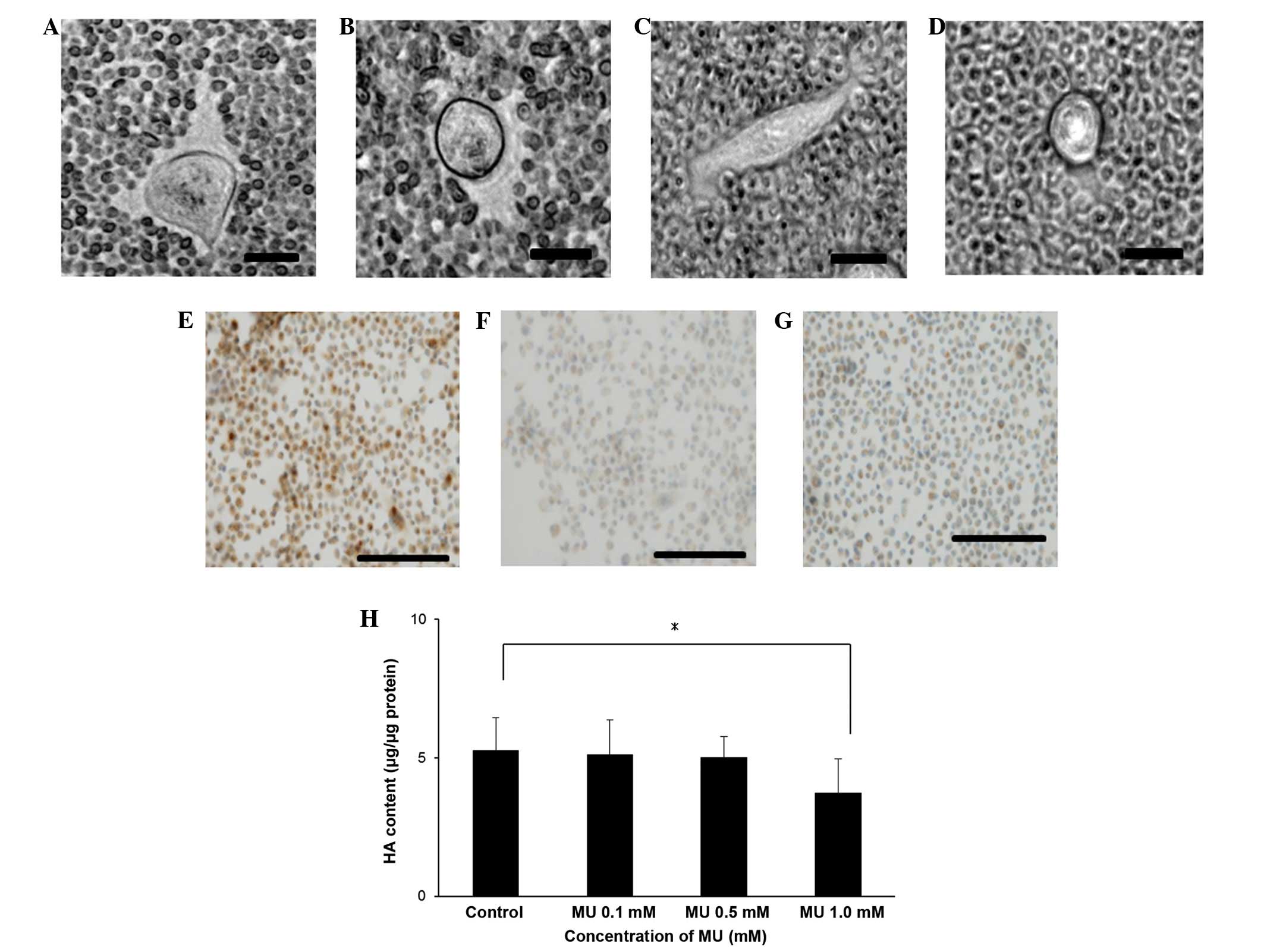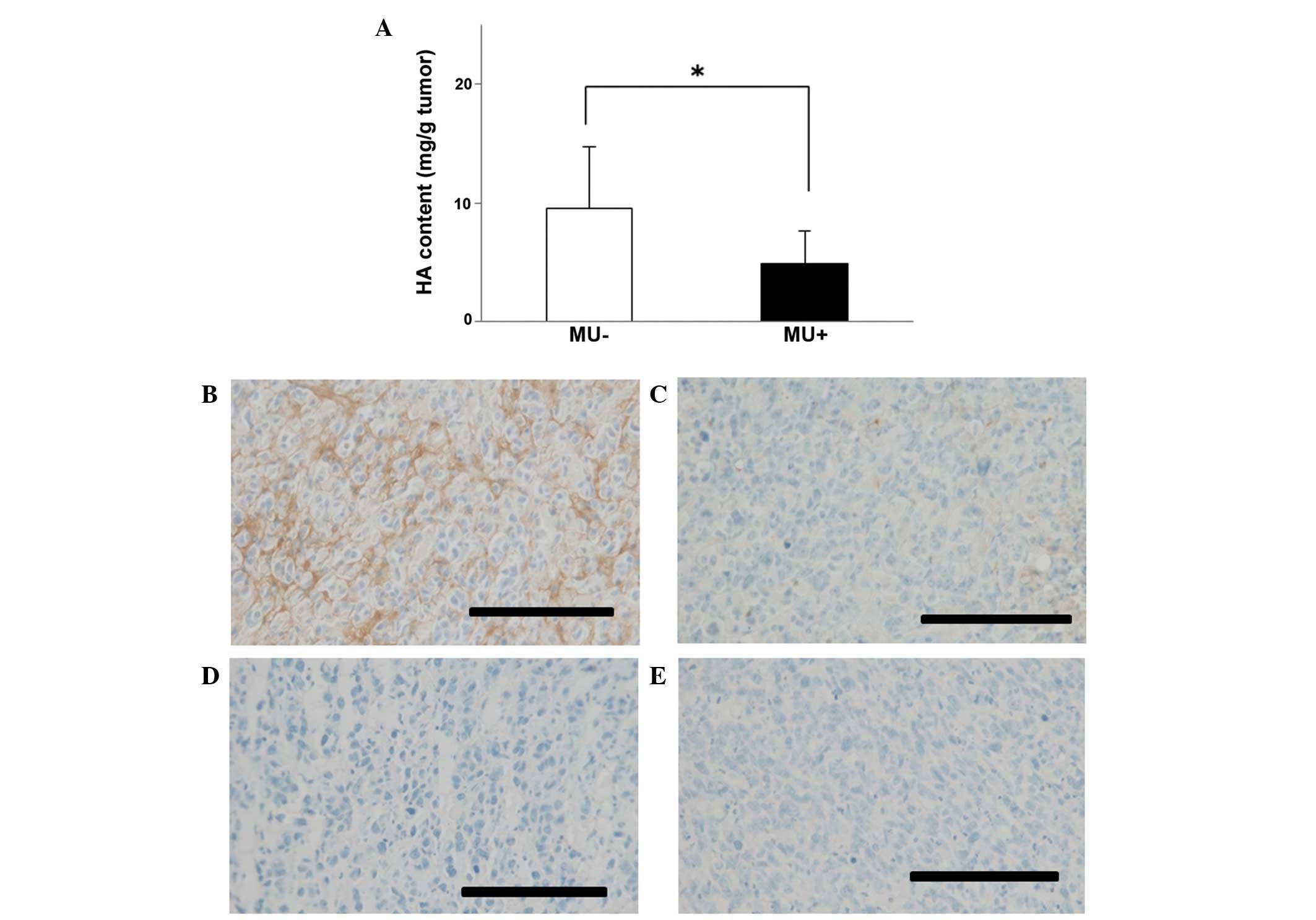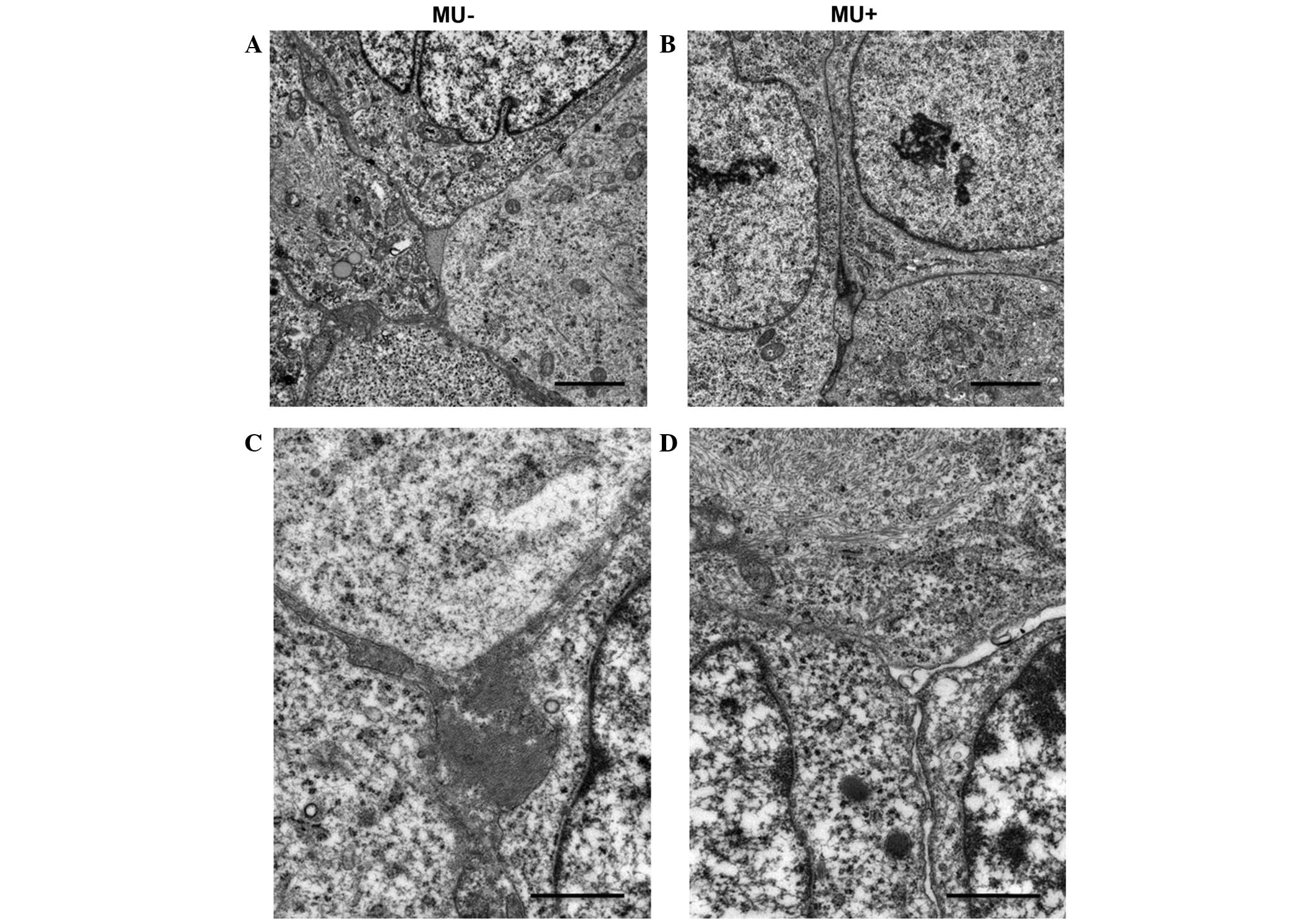|
1
|
Weissmann B and Meyer K: The structure of
hyalobiuronic acid and of hyaluronic acid from umbilical cord. J Am
Chem Soc. 76:1753–1757. 1954. View Article : Google Scholar
|
|
2
|
Weigel PH, Hascall VC and Tammi M:
Hyaluronan synthases. J Biol Chem. 272:13997–14000. 1997.
View Article : Google Scholar : PubMed/NCBI
|
|
3
|
Menzel EJ and Farr C: Hyaluronidase and
its substrate hyaluronan: Biochemistry, biological activities and
therapeutic uses. Cancer Lett. 131:3–11. 1998. View Article : Google Scholar : PubMed/NCBI
|
|
4
|
Auvinen P, Tammi R, Parkkinen J, Tammi M,
Agren U, Johansson R, Hirvikoski P, Eskelinen M and Kosma VM:
Hyaluronan in peritumoral stroma and malignant cells associates
with breast cancer spreading and predicts survival. Am J Pathol.
156:529–536. 2000. View Article : Google Scholar : PubMed/NCBI
|
|
5
|
Zhang L, Underhill CB and Chen L:
Hyaluronan on the surface of tumor cells is correlated with
metastatic behavior. Cancer Res. 55:428–433. 1995.PubMed/NCBI
|
|
6
|
Simpson MA, Reiland J, Burger SR, Furcht
LT, Spicer AP, Oegema TR Jr and McCarthy JB: Hyaluronan synthase
elevation in metastatic prostate carcinoma cells correlates with
hyaluronan surface retention, a prerequisite for rapid adhesion to
bone marrow endothelial cells. J Biol Chem. 276:17949–17957. 2001.
View Article : Google Scholar : PubMed/NCBI
|
|
7
|
Itano N, Atsumi F, Sawai T, Yamada Y,
Miyaishi O, Senga T, Hamaguchi M and Kimata K: Abnormal
accumulation of hyaluronan matrix diminishes contact inhibition of
cell growth and promotes cell migration. Proc Natl Acad Sci USA.
99:3609–3614. 2002. View Article : Google Scholar : PubMed/NCBI
|
|
8
|
Anttila MA, Tammi RH, Tammi MI, Syrjänen
KJ, Saarikoski SV and Kosma VM: High levels of stromal hyaluronan
predict poor disease outcome in epithelial ovarian cancer. Cancer
Res. 60:150–155. 2000.PubMed/NCBI
|
|
9
|
Lokeshwar VB, Rubinowicz D, Schroeder GL,
Forgacs E, Minna JD, Block NL, Nadji M and Lokeshwar BL: Stromal
and epithelial expression of tumor markers hyaluronic acid and
HYAL1 hyaluronidase in prostate cancer. J Biol Chem.
276:11922–11932. 2001. View Article : Google Scholar : PubMed/NCBI
|
|
10
|
Setälä LP, Tammi MI, Tammi RH, Eskelinen
MJ, Lipponen PK, Agren UM, Parkkinen J, Alhava EM and Kosma VM:
Hyaluronan expression in gastric cancer cells is associated with
local and nodal spread and reduced survival rate. Br J Cancer.
79:1133–1138. 1999. View Article : Google Scholar : PubMed/NCBI
|
|
11
|
Ropponen K, Tammi M, Parkkinen J,
Eskelinen M, Tammi R, Lipponen P, Agren U, Alhava E and Kosma VM:
Tumor cell-associated hyaluronan as an unfavorable prognostic
factor in colorectal cancer. Cancer Res. 58:342–347.
1998.PubMed/NCBI
|
|
12
|
Collier AC, Tingle MD, Keelan JA, Paxton
JW and Mitchell MD: A highly sensitive fluorescent microplate
method for the determination of UDP-glucuronosyl transferase
activity in tissues and placental cell lines. Drug Metab Dispos.
28:1184–1186. 2000.PubMed/NCBI
|
|
13
|
Nakamura T, Takagaki K, Shibata S, Tanaka
K, Higuchi T and Endo M: Hyaluronic-acid-deficient extracellular
matrix induced by addition of 4-methylumbelliferone to the medium
of cultured human skin fibroblasts. Biochem Biophys Res Commun.
208:470–475. 1995. View Article : Google Scholar : PubMed/NCBI
|
|
14
|
Kakizaki I, Kojima K, Takagaki K, Endo M,
Kannagi R, Ito M, Maruo Y, Sato H, Yasuda T, Mita S, et al: A novel
mechanism for the inhibition of hyaluronan biosynthesis by
4-methylumbelliferone. J Biol Chem. 279:33281–33289. 2004.
View Article : Google Scholar : PubMed/NCBI
|
|
15
|
Kudo D, Kon A, Yoshihara S, Kakizaki I,
Sasaki M, Endo M and Takagaki K: Effect of a hyaluronan synthase
suppressor, 4-methylumbelliferone, on B16F-10 melanoma cell
adhesion and locomotion. Biochem Biophys Res Commun. 321:783–787.
2004. View Article : Google Scholar : PubMed/NCBI
|
|
16
|
Yoshihara S, Kon A, Kudo D, Nakazawa H,
Kakizaki I, Sasaki M, Endo M and Takagaki K: A hyaluronan synthase
suppressor, 4-methylumbelliferone, inhibits liver metastasis of
melanoma cells. FEBS Lett. 579:2722–2726. 2005. View Article : Google Scholar : PubMed/NCBI
|
|
17
|
Piccioni F, Malvicini M, Garcia MG,
Rodriguez A, Atorrasagasti C, Kippes N, Piedra Buena IT, Rizzo MM,
Bayo J, Aquino J, et al: Antitumor effects of hyaluronic acid
inhibitor 4-methylumbelliferone in an orthotopic hepatocellular
carcinoma model in mice. Glycobiology. 22:400–410. 2012. View Article : Google Scholar : PubMed/NCBI
|
|
18
|
Lokeshwar VB, Lopez LE, Munoz D, Chi A,
Shirodkar SP, Lokeshwar SD, Escudero DO, Dhir N and Altman N:
Antitumor activity of hyaluronic acid synthesis inhibitor
4-methylumbelliferone in prostate cancer cells. Cancer Res.
70:2613–2623. 2010. View Article : Google Scholar : PubMed/NCBI
|
|
19
|
Pályi-Krekk Z, Barok M, Isola J, Tammi M,
Szöllosi J and Nagy P: Hyaluronan-induced masking of ErbB2 and
CD44-enhanced trastuzumab internalisation in trastuzumab resistant
breast cancer. Eur J Cancer. 43:2423–2433. 2007. View Article : Google Scholar : PubMed/NCBI
|
|
20
|
Vincent A, Herman J, Schulick R, Hruban RH
and Goggins M: Pancreatic cancer. Lancet. 378:607–620. 2011.
View Article : Google Scholar : PubMed/NCBI
|
|
21
|
Raimondi S, Maisonneuve P and Lowenfels
AB: Epidemiology of pancreatic cancer: An overview. Nat Rev
Gastroenterol Hepatol. 6:699–708. 2009. View Article : Google Scholar : PubMed/NCBI
|
|
22
|
Berrino F, De Angelis R, Sant M, Rosso S,
Bielska-Lasota M, Coebergh JW and Santaquilani M: EUROCARE Working
group: Survival for eight major cancers and all cancers combined
for European adults diagnosed in 1995-99: Results of the EUROCARE-4
study. Lancet Oncol. 8:8682007. View Article : Google Scholar
|
|
23
|
Cheng XB, Sato N, Kohi S and Yamaguchi K:
Prognostic impact of hyaluronan and its regulators in pancreatic
ductal adenocarcinoma. PLoS One. 8:e807652013. View Article : Google Scholar : PubMed/NCBI
|
|
24
|
Nakazawa H, Yoshihara S, Kudo D, Morohashi
H, Kakizaki I, Kon A, Takagaki K and Sasaki M:
4-methylumbelliferone, a hyaluronan synthase suppressor, enhances
the anticancer activity of gemcitabine in human pancreatic cancer
cells. Cancer Chemother Pharmacol. 57:165–170. 2006. View Article : Google Scholar : PubMed/NCBI
|
|
25
|
Knudson CB and Toole BP: Changes in the
pericellular matrix during differentiation of limb bud mesoderm.
Dev Biol. 112:308–318. 1985. View Article : Google Scholar : PubMed/NCBI
|
|
26
|
Lin W, Shuster S, Maibach HI and Stern R:
Patterns of hyaluronan staining are modified by fixation
techniques. J Histochem Cytochem. 45:1157–1163. 1997. View Article : Google Scholar : PubMed/NCBI
|
|
27
|
Chichibu K, Matsuura T, Shichijo S and
Yokoyama MM: Assay of serum hyaluronic acid in clinical
application. Clin Chim Acta. 181:317–323. 1989. View Article : Google Scholar : PubMed/NCBI
|
|
28
|
Barbosa H, Slater NK and Marcos JC:
Protein quantification in the presence of poly(ethylene glycol) and
dextran using the Bradford method. Anal Biochem. 395:108–110. 2009.
View Article : Google Scholar : PubMed/NCBI
|
|
29
|
Nojiri S and Joh T: Albumin suppresses
human hepatocellular carcinoma proliferation and the cell cycle.
Int J Mol Sci. 15:5163–5174. 2014. View Article : Google Scholar : PubMed/NCBI
|
|
30
|
Decker T and Lohmann-Matthes ML: A quick
and simple method for the quantitation of lactate dehydrogenase
release in measurements of cellular cytotoxicity and tumor necrosis
factor (TNF) activity. J Immunol Methods. 115:61–69. 1988.
View Article : Google Scholar : PubMed/NCBI
|
|
31
|
Andarini S, Kikuchi T, Nukiwa M, Pradono
P, Suzuki T, Ohkouchi S, Inoue A, Maemondo M, Ishii N, Saijo Y, et
al: Adenovirus vector-mediated in vivo gene transfer of OX40 ligand
to tumor cells enhances antitumor immunity of tumor-bearing hosts.
Cancer Res. 64:3281–3287. 2004. View Article : Google Scholar : PubMed/NCBI
|
|
32
|
Stern M and Stern R: An ELISA-like assay
for hyaluronidase and hyaluronidase inhibitors. Matrix. 12:397–403.
1992. View Article : Google Scholar : PubMed/NCBI
|
|
33
|
Luna LG: Manual of Histologic Staining
Methods of the Armed Forces Institute of Pathology. 3rd edition.
Blakiston Division, McGraw-Hill; New York: 1968
|
|
34
|
Meyer LJ and Stern R: Age-dependent
changes of hyaluronan in human skin. J Invest Dermatol.
102:385–389. 1994. View Article : Google Scholar : PubMed/NCBI
|
|
35
|
Knudson W, Biswas C and Toole BP:
Interactions between human tumor cells and fibroblasts stimulate
hyaluronate synthesis. Proc Natl Acad Sci USA. 81:6767–6771. 1984.
View Article : Google Scholar : PubMed/NCBI
|
|
36
|
Sironen RK, Tammi M, Tammi R, Auvinen PK,
Anttila M and Kosma VM: Hyaluronan in human malignancies. Exp Cell
Res. 317:383–391. 2011. View Article : Google Scholar : PubMed/NCBI
|
|
37
|
Buckway B, Wang Y, Ray A and Ghandehari H:
Overcoming the stromal barrier for targeted delivery of HPMA
copolymers to pancreatic tumors. Int J Pharm. 456:202–211. 2013.
View Article : Google Scholar : PubMed/NCBI
|
|
38
|
Camenisch TD, Spicer AP, BrehmGibson T,
Biesterfeldt J, Augustine ML, Calabro A Jr, Kubalak S, Klewer SE
and McDonald JA: Disruption of hyaluronan synthase-2 abrogates
normal cardiac morphogenesis and hyaluronan-mediated transformation
of epithelium to mesenchyme. J Clin Invest. 106:349–360. 2000.
View Article : Google Scholar : PubMed/NCBI
|
|
39
|
Garrett ER, Venitz J, Eberst K and Cerda
JJ: Pharmacokinetics and bioavailabilities of hymecromone in human
volunteers. Biopharm Drug Dispos. 14:13–39. 1993. View Article : Google Scholar : PubMed/NCBI
|
|
40
|
Fontaine L, Grand M, Molho D, Chabert MJ
and Boschetti E: Choleretic, spasmolytic and general pharmacologic
activities of 4-methylumbelliferone. Therapie. 23:51–62. 1968.(In
French). PubMed/NCBI
|
|
41
|
Hoult JR and Payá M: Pharmacological and
biochemical actions of simple coumarins: Natural products with
therapeutic potential. Gen Pharmacol. 27:713–722. 1996. View Article : Google Scholar : PubMed/NCBI
|
|
42
|
Karbownik MS and Nowak JZ: Hyaluronan:
Towards novel anti-cancer therapeutics. Pharmacol Rep.
65:1056–1074. 2013. View Article : Google Scholar : PubMed/NCBI
|
|
43
|
Baumgartner G, Gomar-Höss C, Sakr L,
Ulsperger E and Wogritsch C: The impact of extracellular matrix on
the chemoresistance of solid tumors - experimental and clinical
results of hyaluronidase as additive to cytostatic chemotherapy.
Cancer Lett. 131:85–99. 1998. View Article : Google Scholar : PubMed/NCBI
|
|
44
|
Whatcott CJ, Han H, Posner RG, Hostetter G
and Von Hoff DD: Targeting the tumor microenvironment in cancer:
Why hyaluronidase deserves a second look. Cancer Discov. 1:291–296.
2011. View Article : Google Scholar : PubMed/NCBI
|
|
45
|
Takada M, Yamamoto M and Saitoh Y: The
significance of CD44 in human pancreatic cancer: II. The role of
CD44 in human pancreatic adenocarcinoma invasion. Pancreas.
9:753–757. 1994. View Article : Google Scholar : PubMed/NCBI
|
|
46
|
Tang SC and Chen YC: Novel therapeutic
targets for pancreatic cancer. World J Gastroenterol.
20:10825–10844. 2014. View Article : Google Scholar : PubMed/NCBI
|



















